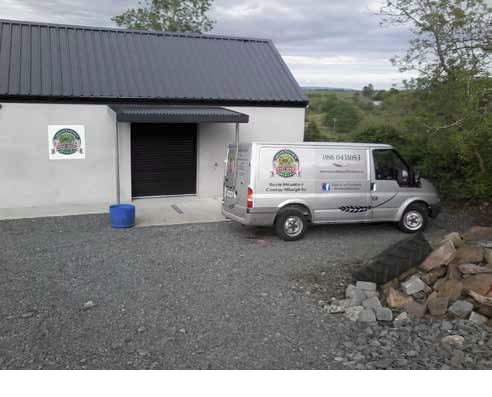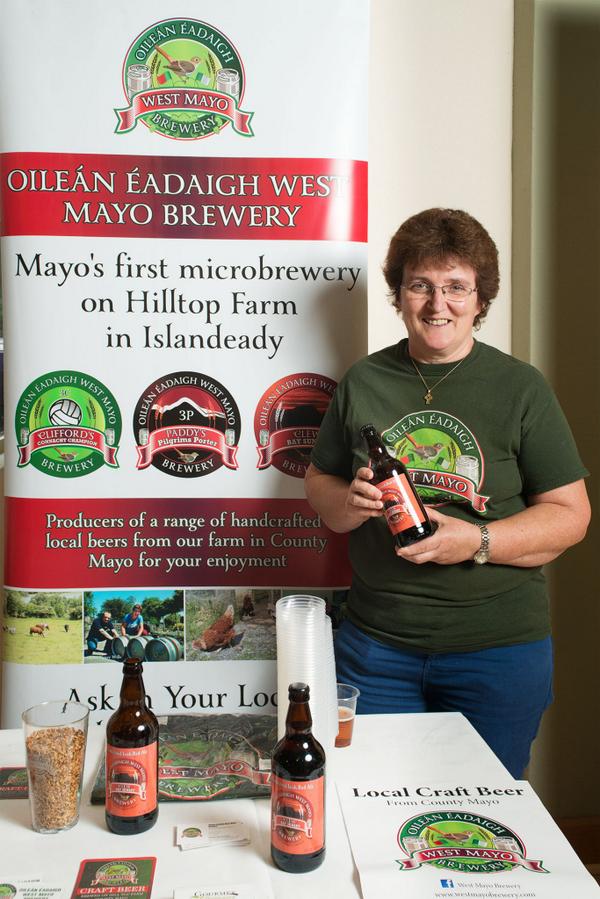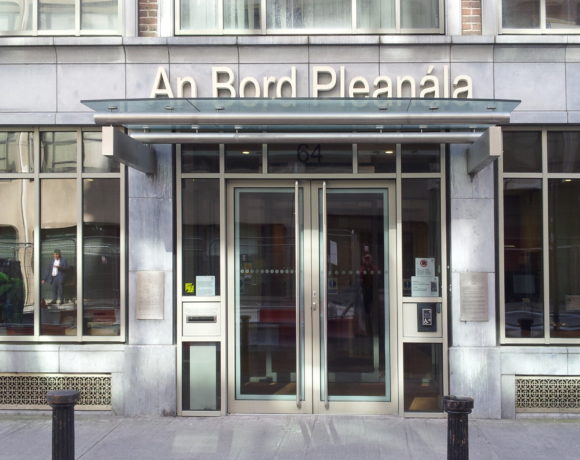Operated from Hilltop Farm, West Mayo Brewery was Mayo’s first microbrewery, and the first new
brewery in the county for nearly 200 years. When Iain and Caroline Price first considered starting the business, they had no idea that craft beers were going to explode nationally – brewing was just a hobby which they thought might translate into a nice diversification of their farming livelihood.
Hilltop Farm is located in the parish of Islandeady, between Westport and Castlebar, and it is from this location that the couple now produce three beers: Clifford’s Connaught Champion, a golden ale, Clewbay Sunset, an Irish Red Ale, and Paddy’s Pilgrim Porter, a traditional porter brewed with bog myrtle from the farm.
These beers are available on draught in bars and restaurants throughout Mayo, and bottled in Supervalu’s and Centra’s across the country. The business develops on the basis of word of mouth and forming direct, personalized relationships with suppliers and publicans. We talked to Caroline about craft brewing, the food/drink sector in Mayo, and the challenges and rewards of combining farming and brewing.
How did you get started as microbrewers?
We moved back from England in 1996, and took over a small, 28 acre farm here in the West of Ireland which was overrun and derelict. We set about transforming that, and as the years went by realized that we weren’t going to earn a living just from farming on its own, and we wanted to work from home so we started looking into various business opportunities. One of the things we’d been doing throughout this time was making beer for ourselves. One thing we didn’t like about moving home was the complete lack of choice when you went out for a drink, so we’d been making beer in a wooden shed in the yard.
So we started thinking about that seriously, and went to visit some microbreweries in England and we thought “Sure, that’s just another shed – that can’t be too difficult.” We did the Camino Walk in 2010, and we came back from that all energized and said “That’s it – this is the year we’re going for it!” There years later, we went into production. Iain went to the UK and did a diploma in brewing and then he did the Institute of Brewing distilling exams, so basically he knows the science as well as the art behind brewing process. We had previously worked as freelance IT consultants, so we’d a fair bit of business knowledge between us.
We started production on the sixth of June, 2013. We saw a very small set-up in a place called Plockton in the north of Scotland – a guy whowas basically in a shed down a lane-way, and he was producing lovely beers and selling them to the local pubs. We thought that was the model we’d base ours on: a local craft beer that we’ll bring out to the pubs ourselves. And that’s what we do effectively: we have 3 beers in total, and we do all the deliveries and the maintenance and everything ourselves.
What kind of supports were available at local government level when the business was starting out?
We found that the supports were fantastic insofar as everybody we met was very positive and kindly disposed towards us and very helpful. We did find that there was a slight lack of joined up thinking between each department – that each department, with the best will in the world, didn’t necessarily know what another department was doing. It was a learning process that I think could have been short-cutted by a long distance if we had a blueprint to start with of which things we needed to do and in which order. That was just a logistics thing, and I believe the process is much smoother now because so many people have been through it so it’s a well-worn track.
We got financial and mentoring support from the Leader office in Newport, and they were hugely supportive right the way through – the board of Leader were very much in our favour and wanted us to succeed and helped us any way they could. That made a huge difference to us in the first year. I also think that having a Food Officer in Mayo has been really good for us, and really good for lots of other food businesses – somebody who is dedicated to the food-sector and who keeps you in touch with everything that is coming up, whether its a potential event, sponsorship, or competition.
Another thing which we’ve found very positive is being involved with the Gourmet Greenway group, which is the brainchild of Mulranny Park Hotel, but it incorporates food-suppliers who are based around the Greenway between Westport, Newport, and down into Achill. So we have people who produce shellfish, honey, beer, and all those different products, as well as the locations along the Greenway. We’ve had great feedback from that, and we got a spot of Nationwide last year because of it. None of the suppliers in the Gourmet Greenway are directly competing, so what’s good for one of us is good for all of us.
And it’s great for the food sector when it’s combined with tourism.
They work so much hand in glove. People love to come and see the scenery in the west of Ireland, but we need to get the message out there that there’s more to see than the scenery, and there are so many nice aspects to coming, between adventure,sports, and walks, and then the food and drink side of it. I think it the past we weren’t very good at marketing, but we’ve got the idea now, and I think we’re doing it properly.
When you were in the initial stages of starting the company, did you realize that the popularity of craft beers was going to explode so much?
Not at all. We were going to do it anyway. When we were having the brewing equipment installed, one of the guys who was doing it said “I think you’re starting at a good time, because craft beers are about to take off in Ireland.” We said “I hope you’re right”(laughs), but we didn’t know. But, to put things into perspective, we were recently invited to an event in Germany next year which is the 500th anniversary of their starting to brew local beers.
Ireland in the past had many breweries dotted around the place – we spoke to a local historian, and he could name some of those breweries. We’d love to be able to find an old recipe, but we haven’t been able so far. We know there was a brewery in Ballinrobe and one in Westport, but other than that, we can’t find any recipes or direct traces of them. But we use bog myrtle in one of our beers, and that would have been used centuries ago in Ireland to make beers, along with meadowsweet, nettles, before they started importing hops.
How do you define the difference between craft beers and the big commercial beers?
The definition I’ve heard recently is under a certain scale – it’s not an industrial process. It’s still a fairly generous amount – something like 30,000 hectare litres per year – so you can still be a sizeable operation. It has to be independently owned. There are ones which are coming on-stream now that aren’t independently owned – they are the offshoot of a large corporation who have decided to market themselves as a craft outfit. But what we do is hand-crafted – we pour in the bags of grain by hand.
And a craft beer won’t have any additives or preservatives – the commercial brewers freeze the beer, and add ingredients to give it its head and profile – so the profile doesn’t come from the ingredients, its added afterwards. So it’s a very different process – it’s the difference between a commercially produced white loaf and an artisan bakery. Allegedly, you don’t get a hangovers from craft beers in the same way that you do from commercial beers, because you’re not ingesting all those additives. That’s hearsay, though!
So it’s good that we have so much choice now, whereas for a long time we had very little in Irish pubs.
It’s great for the consumers that there’s choice, but it’s also great for the publicans. We’ve had quite a number of publicans who are very much in favour of having independent suppliers, so they’re not completely dependent on the big companies to supply them. In some instances, with the bigger companies, they’re treated quite badly, and they love the idea that you’re independent, as opposed to a really big corporation that doesn’t care about you on a personal level. We have to do what we’re good at, as in it’s local, we can deliver it when they need it, and you’re dealing with a person and not a big operation.
Is it difficult to balance the farm business and brewery, or do the two of them harmonize well?
They harmonize fairly well in terms of use of resources. For example, all our spent grain from the brewery, which other people have to get rid of, we can give straight to our cattle. They benefit, and it saves us having to get feed for them for the winter. There are lot of things like that in which there is a great symbiosis between the two projects.
In terms of being busy, it can be just the time when you’re busy with one thing, that something kicks off with the other! We try to keep a balance between the two. Time management is crucial, and we really have to coordinate between what I’m doing and what Iain is doing, so one of us can concentrate on the farming side of things, if the other is tied up with the brewery for the day.
What advice would you offer to people who are considering becoming craft brewers, and to farmers who are considering undertaking a diversification projects like what you and Iain have done on Hilltop Farm?
To answer your first question, there are lots of very good brewers out there, and there are lots of good business people, but the two don’t necessarily inhabit the same body. For any small business, you need a combination of skills – business skills as well as the brewing skills. But it’s also true that you if haven’t got the right product, it’s not going to succeed just because it has the word “craft” on front of it. So you need both sides of it – the passion for the product, to understand it and to want to do it properly – combined with the business sense.
To answer the second regarding diversification, there are lots of different ways you can diversify on a farm, and some of the organisations that help farmers are a bit slow in coming forward with ideas, or slow to take them on-board when ideas are put to them. They have a specific mindset of what farm diversification should involve – greyhounds, or phonies, or whatever – and they don’t necessarily see a broader picture.
There isn’t a structure in place or a blueprint for doing what we did. Obviously, it involves investing a fair bit of money, and getting the skills, and having the right person behind it. A good farmer won’t necessarily make a good brewer, but then there are some farmers who would make fantastic brewers, and already have the business skills to running a successful farm.
Picture:Caroline Price, West Mayo Brewery














